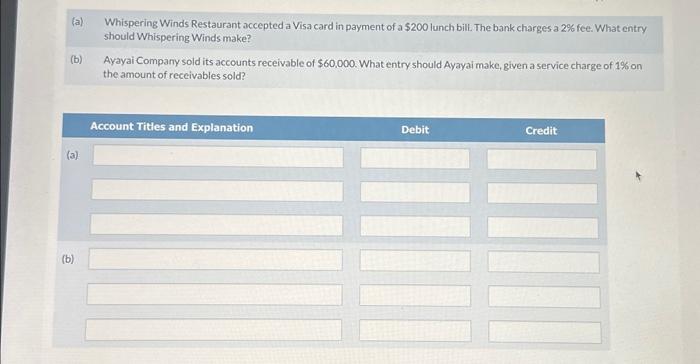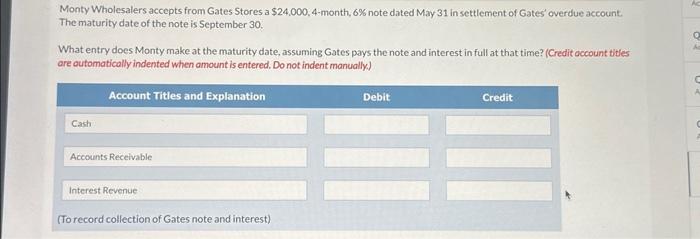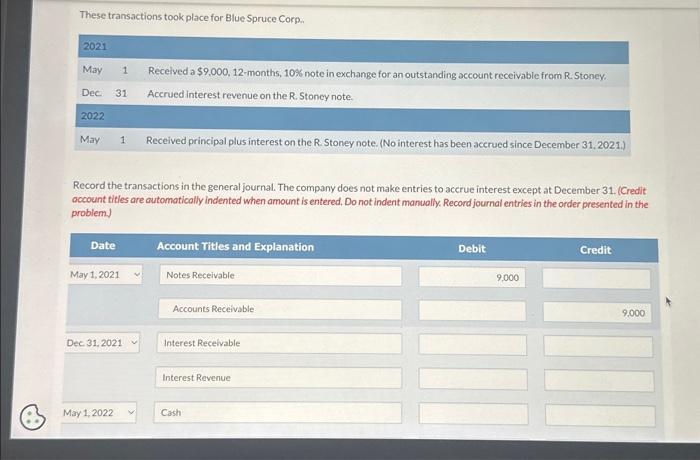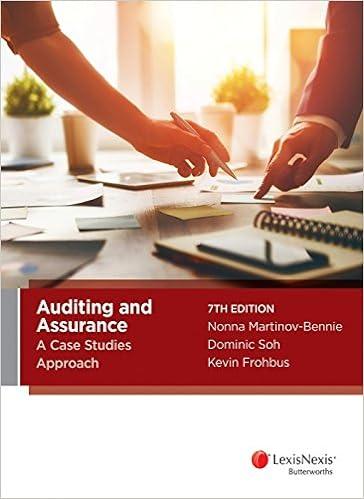help me with these 4 question!
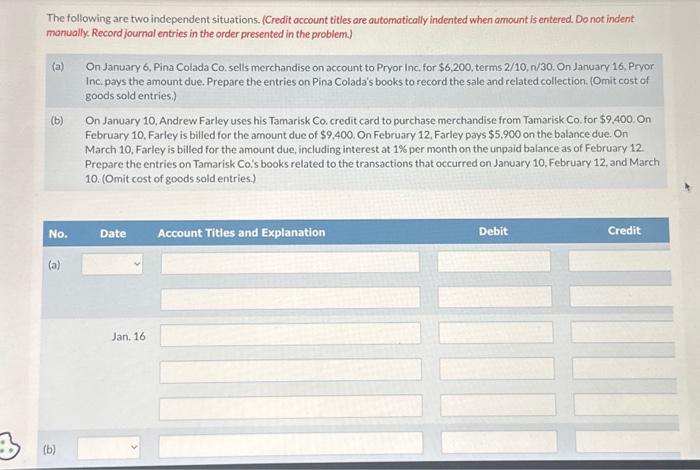
The following are two independent situations. (Credit account titles are outomatically indented when amount is entered. Do not indent manually. Record journal entries in the order presented in the problem.) (a) On January 6, Pina Colada Co, selis merchandise on account to Pryor Inc, for $6,200, terms 2/10,n/30, On January 16 , Pryor Inc. pays the amount due. Prepare the entries on Pina Colada's books to record the sale and related collection. (Omit cost of goods sold entries.) (b) On January 10. Andrew Farley uses his Tamarisk Co. credit card to purchase merchandise from Tamarisk Co. for $9.400. On February 10, Farley is billed for the amount due of $9.400. On February 12. Farley pays $5.900 on the balance due. On March 10, Farley is billed for the amount due, including interest at 1% per month on the unpaid balance as of February 12. Prepare the entries on Tamarisk Co's books related to the transactions that occurred on January 10, February 12, and March 10. (Omit cost of goods sold entries.) (a) Whispering Winds Restaurant accepted a Visa card in payment of a $200 lunch bill. The bank charges a 2% fee. What entry should Whispering Winds make? (b) Ayayai Company sold its accounts receivable of $60,000. What entry should Ayayai make, given a service charge of 1% on the amount of receivables sold? Monty Wholesalers accepts from Gates Stores a $24,000,4-month, 6% note dated May 31 in settlement of Gates' overdue account. The maturity date of the note is September 30 . What entry does Monty make at the maturity date, assuming Gates pays the note and interest in full at that time? (Credit occount titles are outomatically indented when amount is entered. Do not indent manually.) These transactions took place for Blue Spruce Corp. Record the transactions in the general journal. The company does not make entries to accrue interest except at December 31 . (Credit occount titles are outomatically indented when amount is entered, Do not indent manualiy. Record journal entries in the order presented in the problem.) Interest Receivable Interest Revenue Notes Recelvable The following are two independent situations. (Credit account titles are outomatically indented when amount is entered. Do not indent manually. Record journal entries in the order presented in the problem.) (a) On January 6, Pina Colada Co, selis merchandise on account to Pryor Inc, for $6,200, terms 2/10,n/30, On January 16 , Pryor Inc. pays the amount due. Prepare the entries on Pina Colada's books to record the sale and related collection. (Omit cost of goods sold entries.) (b) On January 10. Andrew Farley uses his Tamarisk Co. credit card to purchase merchandise from Tamarisk Co. for $9.400. On February 10, Farley is billed for the amount due of $9.400. On February 12. Farley pays $5.900 on the balance due. On March 10, Farley is billed for the amount due, including interest at 1% per month on the unpaid balance as of February 12. Prepare the entries on Tamarisk Co's books related to the transactions that occurred on January 10, February 12, and March 10. (Omit cost of goods sold entries.) (a) Whispering Winds Restaurant accepted a Visa card in payment of a $200 lunch bill. The bank charges a 2% fee. What entry should Whispering Winds make? (b) Ayayai Company sold its accounts receivable of $60,000. What entry should Ayayai make, given a service charge of 1% on the amount of receivables sold? Monty Wholesalers accepts from Gates Stores a $24,000,4-month, 6% note dated May 31 in settlement of Gates' overdue account. The maturity date of the note is September 30 . What entry does Monty make at the maturity date, assuming Gates pays the note and interest in full at that time? (Credit occount titles are outomatically indented when amount is entered. Do not indent manually.) These transactions took place for Blue Spruce Corp. Record the transactions in the general journal. The company does not make entries to accrue interest except at December 31 . (Credit occount titles are outomatically indented when amount is entered, Do not indent manualiy. Record journal entries in the order presented in the problem.) Interest Receivable Interest Revenue Notes Recelvable



